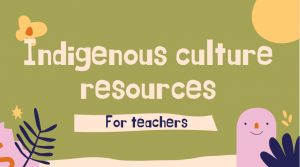17 Indigenous Culture Resources for Teachers
Indiah Sinclair
Rationale
The resource Indigenous culture resources for teachers is an online resource with links to; physical resources, Winangali Infusion, learning resources, eight indigenous ways of learning, local indigenous libraries and printable activities for children from the Kamilaroi/Gamilaraay region, as well as a fun instructional video for educators that includes a quiz at the end. As the resource is online it can be accessed any time, however some of the links are booked per request such as Winangali Infusion. Winangali Infusion itself is an educational cultural experience based in Gamilaraay area, delivering educating people on ancient Gamilaraay ways of life including the ancient art of storytelling, art, song & dance (Winangali Infusion, 2015).
This resource is an appropriate response to educators demands as it answers the question which is finding local knowledge which can be gained through the resources such as Winangali Infusion and Dandiiri Schools and Community Library. The Dandiiri Schools and Community Library is a local indigenous library with an array of knowledge on indigenous communities and stories from all over Australia (Queensland Government Department of Education and Training, 2019). According to Secretariat of National Aboriginal and Islander Child Care [SNAICC], good practice is seen when children are able to participate in relevant cultural learning as a part of routine (Mason-White, 2012). The resources within the Indigenous culture resources for teachers guide enables the educator to navigate what is relevant and how they can embed it into daily routine. Furthermore Sue Atkinson writes about good practice includes good relationships with Aboriginal and Torres Strait Islander parents and caregivers. The resource includes ways in which to incorporate and foster relationships with parents respectfully i.e. the Share our Pride link.
These resources are directly linked to the Early Years Learning Framework [EYLF] (DEEWR, 2009) Principle four respect for diversity as well as Outcome two: children are connected with and contribute to their world. By using the resource, educators are able to foster a sense of belonging for children and a respect for diversity. According to Barfield and Uzarski (2009), by learning about indigenous culture in the classroom children are able to develop a sense of respect for other cultures around them.


